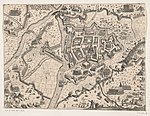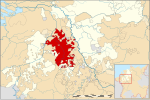Forschungszentrum Jülich (FZJ) is a national research institution that pursues interdisciplinary research in the fields of energy, information, and bioeconomy. It operates a broad range of research infrastructures like supercomputers, an atmospheric simulation chamber, electron microscopes, a particle accelerator, cleanrooms for nanotechnology, among other things. Current research priorities include the structural change in the Rhineland lignite-mining region, hydrogen, and quantum technologies. As a member of the Helmholtz Association with roughly 6,800 employees in ten institutes and 80 subinstitutes, Jülich is one of the largest research institutions in Europe.
Forschungszentrum Jülich’s headquarters are located between the cities of Aachen, Cologne, and Düsseldorf on the outskirts of the North Rhine-Westphalian town of Jülich. FZJ has 15 branch offices in Germany and abroad, including eight sites at European and international neutron and synchrotron radiation sources, two joint institutes with the University of Münster, Friedrich-Alexander Universität Erlangen-Nürnberg (FAU), and Helmholtz-Zentrum Berlin (HZB), and three offices of Project Management Jülich (PtJ) in the cities of Bonn, Rostock, and Berlin. Jülich cooperates closely with RWTH Aachen University within the Jülich Aachen Research Alliance (JARA).The institution was established on 11 December 1956 by the state of North Rhine-Westphalia as a registered association before it was renamed Nuclear Research Centre Jülich in 1967. In 1990, its name was changed to “Forschungszentrum Jülich GmbH”.










